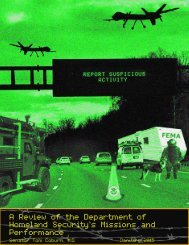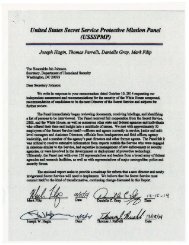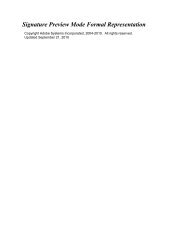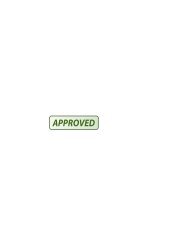14_1218_usss_pmp
You also want an ePaper? Increase the reach of your titles
YUMPU automatically turns print PDFs into web optimized ePapers that Google loves.
~ Present a zer«>-based or mission-based budget that will provide sufficient resources to<br />
accomplish its mission, beginning immediately by worldng within DBS to adopt a workforce<br />
staffing model: The Service must build a new budget from the ground up by defining its mission,<br />
determining what it will take to achieve it, and asking for that. The mission is important enough to<br />
justify that approach.<br />
~ Create more opportunities for officers and agents to provide input on their mission and train its<br />
mid- and lower-level managers to encourage, value and respond to such feedback: Leadership<br />
and, even more critically, mid- and lower-level managers, need to make clear that their mission<br />
requires that they get things right-and thus that the agency values information out of sync with the<br />
status quo or the leadership's views.<br />
~ Lead the federal protective force community: Collaboration with protective forces like the Federal<br />
Protective Service, the Pentagon Force Protection Agency, the FBI Police, and the State Department's<br />
Bureau of Diplomatic Security and other agencies, especially on technology, could significantly<br />
increase opportunities for innovation.<br />
~ Receive periodic, outside assessments of the threats to and strategies for protecting the White<br />
House compound: The Secret Service should engage other federal agencies to evaluate the threats<br />
that the agency faces and its ways of doing business.<br />
~ Resume participation in international fora with comparable protective services of friendly<br />
nations: While most national protective forces do not compare to the Secret Service, those of certain<br />
nations are much more similar than they are different.<br />
~ Give leadership's priorities and reforms the organization's sustained attention and hold the<br />
agency accountable through to their completion: Following through on reforms and<br />
recommendations has been an issue for the Service in the past.<br />
~ Implement a disciplinary system in a consistent manner ~hat demonstrates zero tolerance for<br />
failures that are incompatible with its zer«>-failure mission: It is clear that the rank-and-file-and<br />
even very senior current and former members of the Secret Service-do not have confidence that<br />
discipline is imposed in a fair and consistent manner.<br />
~ Hold forces accountable for performance by using front-line supervisors to constantly test<br />
readiness: To be ready for a job where quick reactions and reflexes are critical, supervisors need to<br />
drive home to their officers and agents that the front line is constantly being tested.<br />
~ The next director of the Secret Service should be a strong leader from outside the agency who<br />
has a protective, law enforcement, or military background and who can drive cultural change<br />
in the organization and move the Secret Service forward into a new era: The need to change,<br />
reinvigorate, and question long-held assumptions-from within the agency itself-is too critical right<br />
now for the next director to be an insider.<br />
~ Establish a leadership development system that identifies and trains the agency's future<br />
managers and leaders: To promote from within and move the agency forward, however, the Secret<br />
Service needs to do a better job of identifying future leaders and preparing them for the role.<br />
8









![55721335-d6fe09eb5ffdcc87dbf6c3f0b5bbda07d2261e98[1]](https://img.yumpu.com/56533583/1/186x260/55721335-d6fe09eb5ffdcc87dbf6c3f0b5bbda07d2261e981.jpg?quality=85)








